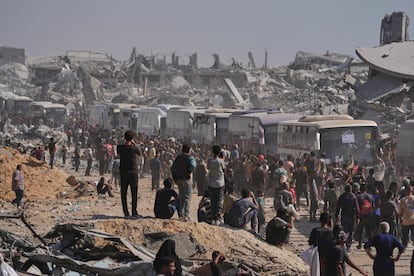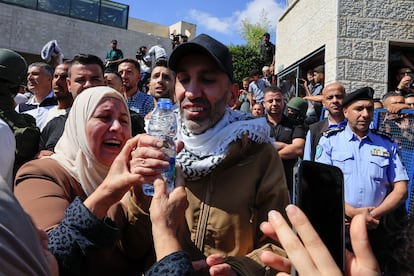Israel began this Monday to close one of the most painful chapters in its brief history. It did so when Hamas completed the handover of the last 20 Israeli hostages still alive in Gaza, a release broadcast on a giant screen before several thousand people in the square now renamed Hostage Square in central Tel Aviv. Amid tears of joy and shouts of enthusiasm, they watched the images of a handover that took place in two phases and which, within the framework of an exchange for the release of nearly 2,000 Palestinian prisoners, represented the partial (the return of the bodies is still pending) but successful completion of the first major test of Donald Trump's plan for Gaza. Its future, now, remains full of challenges.
The first group, consisting of seven kidnapped people, arrived around 9:00 a.m. (8:00 a.m. Spanish time); and a second group, consisting of the remaining 13, arrived three hours later. All were handed over by Hamas to the International Committee of the Red Cross, which handed them over to the Israeli army, where they underwent medical examinations in the country's hospitals.
After receiving them, Israel began releasing the Palestinian prisoners, a process that has left very mixed images. While a crowd enthusiastically welcomed the bulk (1,718) in Khan Yunis—in southern Gaza, where the presence of armed militants illustrates the challenges still facing Donald Trump's plan—another 154 were expelled to Egypt through the back door. The atmosphere was also very different in the West Bank, where hundreds of family members and friends welcomed 88. They arrived haggard, with signs of violence and unwilling to talk (unlike previous exchanges), reporting threats from the Israeli secret services if they did.
The excitement of the morning will now give way to a mixture of relief and grief, with the expected return of the last 28 bodies of Israeli hostages. It is unclear when this will take place, nor whether the Palestinian militias have been able to locate all the remains. The Forum of Families of Hostages and Missing Persons had stated that only four bodies would be returned that day, something it described as a"flagrant violation" of the ceasefire. By mid-afternoon, Hamas had handed over only two of those four bodies.
Their grief is the only thing that mars this day of celebration in Israel for the return of the captives alive. The families' forum noted in a statement that their struggle will not end until they receive a proper burial:"Only then will the people of Israel be complete," it summed up. The family of Guy Gilboa-Dalal, one of the Israelis released alive, hoped that the families of the deceased would be able to bury them.
Israeli civilians celebrate the release of all Gaza hostages
As the crowd erupted in cheers as images of the convoy carrying the first seven captives traveled along an Israeli highway, US President Donald Trump arrived in Israel.
“Thank you, Mr. President!”
The screen in Hostage Plaza then unfolded to show, on one side, the cars in which the hostages were traveling and, on the other, Air Force One, which was preparing to land in Tel Aviv."Thank you, Trump! Thank you, Mr. President!" came over the loudspeakers, while many of the Israelis present—some carrying American flags—burst into applause and praise for the president.
Calling him a"savior" or even "the king of Israel"—in the case of Guy, an Israeli who preferred to introduce himself only by his first name—many of those gathered in Tel Aviv Square credited Trump with the agreement which, since Friday, has been accompanied by a permanent ceasefire in Gaza. Without his intervention, several said, it would not have been possible. Both before flying to Israel and upon his arrival, Trump insisted on one idea:"The war is over." Asked if Benjamin Netanyahu also understood this, he reiterated it before adding:"Do you understand?" The expression seemed more directed at the Israeli prime minister than the journalist.

As the first hostages arrived in Israeli territory, buses carrying Palestinian prisoners began leaving Israeli prisons. The vast majority were headed for Gaza, where they were arrested by the Israeli military during the mass arrests carried out over more than two years of invasion, with an eye toward a future hostage exchange. None, in fact, participated in the October 2023 attack that triggered the invasion, according to the Israeli government.
Another 250 prisoners, whose negotiations have been more delicate, were serving long sentences in Israeli prisons. Most of them were serving at least life sentences for participating in or organizing attacks against Israelis. 154 of them have been deported to Egypt, Minister of Prisoners' Affairs Raed Abu Al Humus told this newspaper at the Cultural Palace in the West Bank city of Ramallah, before flying to Egypt to receive them.
Another 88 arrived in Ramallah shortly before noon. Hundreds of family members and friends had been waiting for them, even since early morning. The place had filled up to the point that Palestinian security forces had closed the entrance. Some were dressed in traditional Palestinian attire in celebration. Others wept, shouted"Allah is the greatest," or hugged and kissed the inmates on the forehead as they got off the buses.

The atmosphere, however, was not that of previous exchanges. Not only because of the relatively low number of prisoners released in the West Bank. Also because Israel has refused to include the most charismatic names demanded by Hamas, so there was no Zakaria Zubeidi, as in last January's exchange, to excite the crowd. Their arrival (pale, with shaved heads, all with recent signs of bruises on their faces, and some unable to even walk) generated more shock than joy.
Some got off the bus with the victory sign and were carried by the crowd, but others sat down upon arrival, exhausted. Rescue services offered them wheelchairs, and Palestinian police cleared a path for them to move forward, with difficulty but without discomfort.
“The conditions are extremely difficult and indescribable for us prisoners, as the war has affected the situation inside the prisons. During the last three days, since we were transferred, it was very hard: we suffered beatings, humiliation, and verbal abuse. I cannot go into further details because the occupation [Israel] forbids us from speaking,” one of them told this newspaper, declining to give his name for fear of reprisals.
A second inmate, released after serving 23 years of his life sentence, spoke of"indescribable hardship," especially in the last 72 hours,"marked by indescribable beatings and torture." "To this day, I still can't believe I'm out of prison," he added.
A few Palestinians attempted to greet them in the hills of the West Bank village of Beitunia, near one of the prisons they were released from, Ofer. Clashes erupted between the youths and Israeli soldiers, who fired rubber bullets and tear gas, resulting in one injury, according to medical officials.
Speech in the Knesset
It all happened while the US president was giving a speech to Parliament, something to which only three other US presidents had been invited before: Jimmy Carter (1979), Bill Clinton (1994) and George W. Bush (2008).
That city has also been decorated in his honor, with large posters on buildings featuring his image printed above the flags of Israel and the United States. One even compares him to King Cyrus the Great, the founder of the Achaemenid dynasty in ancient Persia, who freed the Jews from captivity—alluding to his role in the return of the hostages—by conquering Babylon and allowing their return to Jerusalem.
Trump reiterated today that Hamas will disarm to comply with the peace plan and that"the war is over." In the Egyptian city of Sharm el-Sheikh, Trump will participate in the signing ceremony for the Gaza agreement this Monday, attended by leaders of some twenty countries, including Spanish Prime Minister Pedro Sánchez.
Israeli Prime Minister Benjamin Netanyahu will not be present in the Egyptian resort city, his office announced Monday, due to the upcoming celebrations for the release of the freed hostages. Representatives from Hamas will also be absent. Palestinian Authority President Mahmoud Abbas will be present.

